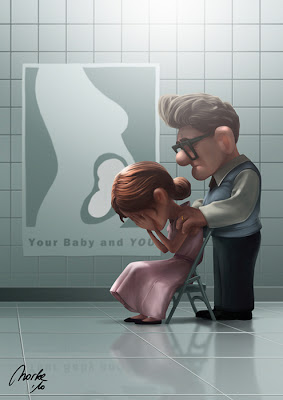Written by Leigh Kolb for our theme week on Infertility, Miscarriage, and Infant Loss.
The students in my African American Literature class read Audre Lorde’s “Now That I Am Forever With Child” this week. I pointed out that although none of us had given birth, we could feel and understand the poem, and as a result even understand the experience on a deeper level.
I asked the one young man in the class his reaction to reading a poem about pregnancy and childbirth. He said that when he first read it, it seemed like something very foreign that he couldn’t imagine, but after reading it again and discussing it, “it felt familiar.” Familiar.
I write and talk often about how women’s stories are marginalized if they’re even told at all, and how that continuously degrades our experiences. I kept thinking about the word familiar, and how powerful it is when others’ lives and experiences are familiar to us. The role of media, in large part, is to familiarize us with life. Feature films and television series serve to entertain, but they play a larger role in normalizing and informing audiences of life–confirming our own lives and introducing us to the lives of others, even if those lives are fictional.
Representations of infertility and pregnancy loss in film and on television are greatly lacking. Neither of these life experiences is familiar to us, unless we go through it ourselves.
I try to rationalize why portrayals of infertility and pregnancy loss are so rare. Where is the action, a scriptwriting professor scribbled in my margins when I had too much internal dialogue or a conversation between female friends. There’s not much action in infertility. The struggle is literally and figuratively inside.
But then I realize I’m just making excuses for Hollywood. Infertility and pregnancy loss are rich with story-line possibilities. The very nature of these tragedies is in lock-step with literary conflicts and archetypes. (Wo)man vs. self? Check. (Wo)man vs. nature? Check. Journey/quest? Check. Unhealable wound? Check.
Hollywood has had some success recently with clips portraying the pain of infertility and pregnancy loss (Up and Julie and Julia, most notably). Why can’t an entire film take up the subject? (And by that I mean a film that doesn’t “solve” infertility through highly problematic magic.)
As a feminist, I’m glad that there isn’t an influx of films that focus solely on a woman’s desire to have a baby, reducing her role in life to just centered on motherhood. But as a feminist struggling with infertility and pregnancy loss, I desperately want to see this struggle faithfully mirrored back to me, both for myself and for everyone, so it becomes familiar.
According to the CDC, almost 11 percent of women have impaired fertility, and 6 percent are infertile. RESOLVE reports that 1 in 8 couples struggles with infertility. The miscarriage rate of known pregnancies is between 15 and 20 percent.
These experiences aren’t rare. So we shouldn’t be made to feel like they are and that we are so alone.
Journalist Mona Eltahawy wrote,
“Women’s stories are too often dismissed. A male editor I once worked with tried to dissuade me from the personal: ‘Who cares about what happened to you?’ The most subversive thing a woman can do is talk about her life as if it really mattered.
It does.”
Our lives do matter. Seeing women’s stories reflected faithfully on-screen cannot only serve us emotionally, but it can practically affect men’s and women’s lives by making the lives of over half of our population familiar. The galvanizing effect of this familiarity is more conversation. For infertility and pregnancy loss, the conversation could lead to more medical studies, legislation regarding insurance coverage and defeating so-called “personhood” measures.
Infertility and pregnancy loss are still far too taboo in our culture, and that has very real consequences. Couples are faced with mental health challenges (certainly feeling as if one’s problems aren’t even on the radar of “real” problems due to lack of representation, and conversation affects people emotionally and mentally), and the majority of states’ insurance plans offer no coverage for anything to do with fertility.
It is human nature to look for ourselves and our own stories reflected back to us in media and in others’ stories. In the case of infertility and pregnancy loss, those representations are almost nonexistent. An already lonely struggle is made to feel even more so without those representations.
Women’s lives have drama. They have journeys and conflicts and tragic struggles. Hollywood should take note.
 |
| A moving still from Up. |
———-
Leigh Kolb is a composition, literature and journalism instructor at a community college in rural Missouri. She wrote “How Not to Be a Dick to Your Infertile Friend” and “It Happened to Me: I Had an Ectopic Pregnancy” at xoJane.

